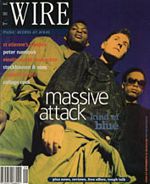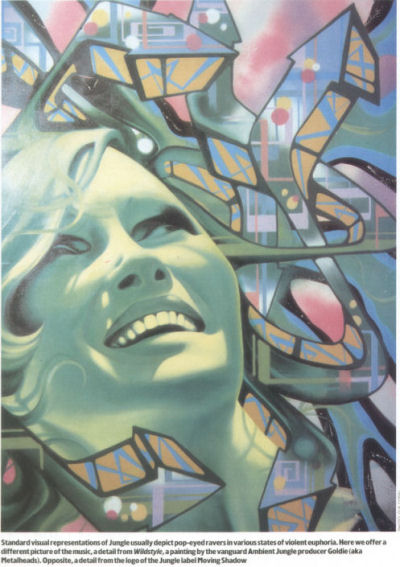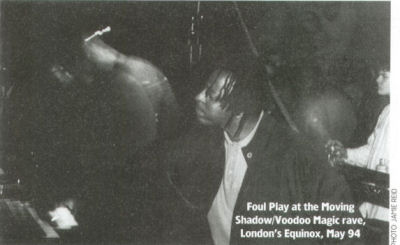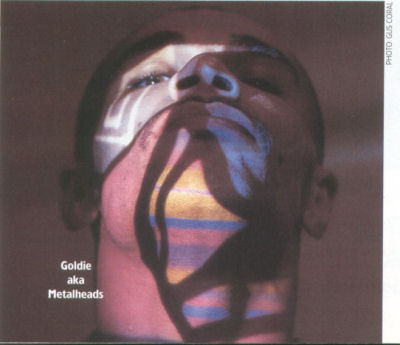| Ambient Jungle - Above The Treeline | |
 |
The Wire Issue 127 September 1994 Page: 36 |
 Jungle is the year's most reviled and feared music, demonised by a hysterical media as the soundtrack to a generation's decline into rampant drug abuse and racial tension. Beyond the tabloid headlines, however, a new generation of musicians are emerging, galvanised by Jungle's delirious energy, and pushing electronic music into new realms of outreach and experiment. Simon Reynolds reports. "Those looking for the next revolution [in electronic music] would do better to watch for what crawls out of the 'Ardkore morass than to carry a torch for Detroit..." So I rashly prophesised in The Wire back in November 1992. For those still wondering, hardcore is both a scene and a sound. Subculturally, it's the hard core of rave culture: working class kids from inner city estates and suburban nowheresvilles who live for the weekend (a cliché but an abiding one). Musically, hardcore is a London-and-surrounding-counties based offshoot of Techno that's defined by sped-up, looped breakbeats as opposed to the linear, programmed rhythms of Trance and House. Always more multi-racial than other post-rave scenes, hardcore got 'blacker' as HipHop, ragga, dub and soul influences began to filter into the music, and by 1993 it had evolved into the sonic terrordome of Jungle. By this point, hardcore/Jungle (the terms remain interchangeable) was universally scorned by dance music pundits and banished from the media. But the scene thrived thanks to a self-sufficient network of small labels, specialist record shops, pirate radio stations and clubs. This year, the press, record industry and legal radio stations like Kiss FM have finally woken up to Jungle. But so far the focus has been on ragga-Jungle, the confluence of accelerated breakbeats and rude boy chatter, while coverage has often been sensationalistic, alluding to unsubstantiated rumours of crack abuse and racial tensions on the scene. Certainly, ragga-Jungle is highly significant as the musical expression of an emergent black-and-white underclass in Britain. It's this nation's equivalent of gangsta rap; the rasping insolence of the patois "booyacka" chants, the ruff beats and stabbing subsonic bass, embody a ghettocentric survivalist toughness. But because attention has focused on the likes of M-Beat and General Levy (whose "Incredible", despite the hype, failed to become Jungle's first crossover hit), hardcore's progressive vanguard has been neglected - artists like Metalheads, Omni Trio, Foul Play, LTJ Bukem, Neil Trix, producing a sound known variously as 'Ambient', 'intelligent' or 'deep' hardcore. It's music of such undeniable beauty and innovation that even Trance-heads and Detroit-nostalgics are starting to turn on to it, while Electronica units like Orbital and Bandulu are incorporating Junglist elements into their sound, and it's even crossed over to the indie rock brigades with Rough Trade's Springheeled Jack single. Back in late 1992, the dominant hardcore sound was still 'happy', ie a mixture of sped-up helium-shrill voices, nutty oscillator riffs, 150 bpm jitter-beats. But the seeds of hardcore's future were already audible. 2 Bad Mice's "Waremouse" trailblazed the 'drum and bass' sound, a minimalist, DJ-mixable mesh of breakbeats and subsonic bass; Metalheads' "Terminator" invented the 'dark' sound, with its eerily processed beats and bad-trip samples. Through the first half of 93 these overlapping sub-genres - dark and drum and bass - increased hardcore's isolation. Alienated by the moody, loveless atmosphere which the dark sound generated, many 'happy hardcore' fans defected to the more clement climes of clubs do which programmed progressive House and Garage, where the old-style 'hands in the air' I euphoria and togetherness of the early rave scene survived (albeit in muted form). But the dark sound opened up a vital space for experimentation. With its premium on headfuck weirdness and disorientating effects, darkcore was the improbable return of early 80s avante-funk. Tuning into the pirate stations, you'd be astonished by tracks that sounded uncannily like Pi's Metal Box, 23 Skidoo, early Cabaret Voltaire. As for drum and bass, its multi-tiered percussion and rhythm-as-melody approach took the ideas of HipHop and dub into the 21st Century. From mid-summer 93, there were the first glimpses of a new direction in hardcore: away from the dark side, towards a new optimism, albeit fragile and bittersweet. From the influential Moving Shadow label :tame bliss-drenched, Ambient-tinged releases like Omni Trio's "Mystic Stepper (Feel Better)" and "Renegade Snares", Foul Play's "Open Your `find" and "Finest Illusion". With tracks like "Music" and "Atlantis (I Need You)", LTJ Bukem invented oceanic hardcore. "Atlantis" was Jungle's own '1983, A Merman I Should Turn To Be": over a whispery sea of beats floated the langorous moans of a 'quiet storm' diva, rippling harps and strings, scintillating motes and spangle-trails of sound. "Atlantis" showed hat speeding up the beat until it bypassed the body altogether could transform hardcore into relaxing music; rhythm itself becomes a susurrating, soothing stream of ambience, a fluid medium in which you immerse yourself, while the body responds to the half-speed, heart-murmur bassline. Perhaps even more radical than "Atlantis" was "Angel" by Metalheads aka Goldie). With the earlier "Terminator", Goldie had pioneered the use )f 'timestretching', a technique that gave breakbeats an eerie metallic crispness. Timestretching also makes it possible to stretch a sample (vocal, whatever) so that it fits any bpm ratio, without changing its pitch (thus avoiding the 'cartoon chipmunk' vocal effect that gave happy hardcore its charm but also made it easy to deride). "Angel" fused Diane Charlemagne's live, jazzy vocal with 150 bpm breaks, samples from My Life /n The Bush Of Ghosts and daemonic synth-vamps. The result an astonishing soundclash of tenderness and terrorism - demonstrated that hardcore could become more conventionally 'musical' without losing its edge. In 94, the floating ethereality of Ambient hardcore has eclipsed the febrile frenzy of the dark sound. Pioneers like Omni Trio and Metalheads are still at the forefront, but close behind are a legion of new contenders - artists such as Roni Size, Easy Rollers, Jo, FBD Project, DJ Crystl, Low Key Movements, Da Intellex, DJ Nut Nut & Pure Science, Peshay, Myerson. Listen to pirate stations like Kool FM, to Kiss FM's weekly Jungle show (Wednesdays, 9-1 1 pm), and every week you'll hear new twists, glimpse fresh futures. Omni Trio is actually just one man. Rob Haigh grew up on an avant-rock diet of Pere Ubu, The Pop Group, The Fall, and above all the Krautrock triumvirate of Can, Faust and Neu!. "I liked the way the German bands abandoned formal song structures and experimented with sounds and textures. . . the repetitive nature of the music, the shifting layers and patterns," he says. Later, Haigh was exposed to Miles Davis's Bitches Brew and the 70s dubs of King Tubby and Lee Perry, and formed an avant-funk band called The Truth Club. Like a lot of avant-funksters, Haigh turned onto House and Techno in 89, drawn in by the sense of experiment that informed records by Derrick May, Orbital and the early releases on the Warp label. But he was even more excited by the first hardcore tracks that made use of HipHop beats. After the harrowing bliss OD of Omni Trio's debut "Volume Two" EP (including tracks like "Mystic Stepper" and "Stronger"), Haigh's sensibility has become more and more that of an 'imaginary soundtrack' composer (John Barry is a big influence). Tracks like "Thru The Vibe", "Rollin' Heights" and "The Soundtrack" (from "Volume Four") are a bit like Saint Etienne at 160 bpm. His songs are epic pop-as-architecture constructions that move expertly through build-up and breakdown, orgasm and afterglow. Haigh orchestrates sampladelic symphonies out of moondust harps, seething bongos and congas, and soul diva a cappella beseechings. "Renegade Snares" (from "Volume Three") is Haigh's biggest tune to date: gushing, Ecstasy-ravaged vocals and mellotronic strings swoon over a beat that's like a cross between James Brown's "Funky Drummer" and an Uzi. Like all Haigh's breakbeats, it's an original construction, built up from 'single shot' samples - kicks, snares, hi-hats, shakers, toms, etc. Omni Trio's latest four track EP, "Volume Five: Soul Promenade" showcases what Haigh sees as a crucial innovation in hardcore, the 'soul step'. "When a tune is rollin' at 160 bpm the first and third beats are emphasised," he says "This gives the illusion that the tune is running at 160 bpm and 80 bpm at the same time. It gives the music room to breathe, and is much easier to dance to." Like the half-speed reggae bassline, the soul-step has made Jungle smooth-grooving, wind-your-waist music; sexy even. This change from manic to mellow accompanies a shift in patterns of drug use within the Jungle milieu: because there aren't so many nutters hammering the E, and more of a smoking vibe, hashed-out langour has replaced speed-freak palsy.  Another Moving Shadow act, Foul Play, has played a crucial role in the rise of Ambient hardcore. Their biggest tune, "Open Your Mind (Foul Play Remix)", wafts billowing soul harmonies (sampled from Kleer) over viciously crisp breaks, but its killer hook is a shimmery ectoplasmic sample-riff that's the closest I've ever heard to an aural simulation of a shiver-down-the-spine, a shudder of luv'd up rapture. Dominating airwaves and dancefloors in late summer 93, "Open Your Mind" signalled that darkcore's days were numbered, that Ambient was the coming thing. "Dark got silly," says Foul Play's Brad. "A lot of it was definitely rock music [ie music for crack heads]." "Open Your Mind" and the equally goosepimply "Finest Illusion" were like the return of 'happy hardcore', only grown up a bit - the callow euphoria now tinged with poignancy, a bittersweet foretaste of the comedown after the high. Since the release of "Open Your Mind", Foul Play have kept a low profile (partly owing to the departure of founder member Steve, who's formed the more ragga-inflected Rogue Unit), only emerging to produce thunderquake remixes of Omni Trio's "Renegade Snares" and Hyper-On-Experience's "Lords Of The Null Lines". But now Brad and partner John have an EP, "Volume Four", in the pipeline, and a long-term pet project that will involve the use of real violin, flutes and harps. "We're writing a score for a performable piece involving us, a vocalist and a 20 piece orchestra," says Brad. "Hopefully it'll make people accept that what we do is music." When Goldie from Metalheads talks about hardcore, the word that crops up the most is "mature". Goldie used to be a graffiti artist in New York (he still daubs canvases - see the example on page 37), and just as aerosol-wielding B-boys transformed vandalistic 'I am SOMEBODY' rage into signature and style, so he turns the delinquent aggression of hardcore into artcore. Goldie's roots lie in HipHop; but he's also a fan of David Sylvian, Eno, Pat Metheny and Miles Davis's 80s recordings. These fusion and Ambient inputs have helped Goldie revolutionise Jungle not once but thrice. First there was "Terminator", then "Angel"; now there's "Timeless", a 22 minute hardcore symphony. Created in collaboration with engineer Rob Playford (boss of Moving Shadow and one third of 2 Bad Mice), "Timeless" is a concept track about Time, about "inner city pressure" and the struggle to survive. Listen to Goldie describe the track's construction, and it's as though every breakbeat, every swathe of morbidly angelic strings, every haunted inflection of Diane Charlemagne's jazz vocal, has some autobiographical referent. This is a man who is intimately acquainted with the dark side of urban life. "When I was 16 I lived right next door to a gambling house. Then I lived in New York and Miami, and saw what was going down there, what's now happening here - the first generation of 'rockstars' [ie crackheads, people who smoke rocks]. Kids who are just going through the paradise state, who are going to become victims. It's all right taking these kids into euphoria, into a dreamstate, but you have to come back to reality. What I'm providing is that comedown. We're dealing with a subculture that's took a lot of drugs. Rob and I know how to tap into their heads. When you're on drugs, don't go near "Timeless", 'cos it will take your soul out, take it on a fuckin' journey, and hand it back to you, smoking. We are about tapping into people's innards. Technically, "Timeless" is like a Rolex: beautiful surface, but the mechanism is a mindfuck. The loops, they've been sculpted, they're in 4D."  Playford and Goldie are so far ahead of the field they've had to coin their own private technical terminology, Eno-style: they talk of "igniting a loop", " snaking out a break", "tubing a sound", and give their pet noises and effects Sci-fi/sword 'n' sorcery names like 'zord', 'blade', 'twister', 'sub-stain'. "Timeless" may be a spooked-out terror ride, but it's also the most accomplished opus that hardcore's yet produced. Avant Jungle, for-sure, but with a crossover potential comparable to, say, Soul II Soul's "Back To Life". No wonder that major labels are competing to sign Goldie, while publishers are talking in terms of soundtracks. But while he's flirting with the majors, Goldie's also set up his own independent label, Metalheads. Ending his long association with the influential Reinforced label, he's taken some of their roster with him - Doc Scott, Wax Doctor, Peshay, Pascal, L Double, Low Key Movements and Dillinja. These artists, and DJ allies like Grooverider, Fabio and Randall, are Goldie's cabal, what he calls "Internal Affairs". Two other prime movers in Ambient hardcore are Goldie associates: Neil Trix (aka Skanna and FBD Project) appeared on the Goldie-supervised Reinforced showcase Enforcers, while Gerald Simpson (aka A Guy Called Gerald) has entrusted the Metalman with the task of remixing his late 80s Acid classic "Voodoo Ray". After unsatisfactory deals with both the small Liverpool label Rham and the somewhat larger Sony, Gerald Simpson went independent with his own label Juice Box, and went Junglist with a series of ruff ragga-tinged tracks (compiled on the album 28 Gun Bad Boy). Since then, Gerald's music has gotten more experimental and otherworldly. "Darker Than I Should Be" is languid, 21st Century jazz funk; "Gloc", choked with spongy sound-blocs that are texture as well as rhythm, is like struggling through the Cubist vegetation of a planet whose lifeforms are based on silicon rather than carbon. Another recent 12", "Nazinji-Zaka", kicks off with the declaration "The first rhythms came from Africa" it's a cyber-juju barrage of poly-, cross- and counter-rhythms that pull your body everywhichway, while pizzicato sound-shapes dart like birds through the digital foliage. "I'll use about five or six drum loops, add electronic percussion, pan 'em across the speakers, feed 'em through effects," says Gerald of the formidable amount of detail in his music. "If people are gonna pay five quid for a track, I'll give 'em their money's worth! If you listen in a room with your eyes closed, things should leap out at you. I create as much dynamics within the music as possible. And my personal rule is that the samples must be totally masked, beyond recognition." Look out for Gerald's forthcoming LP Black Secret Technology, and releases by Juice Box proteges The KGB and Nebula. 24 year old Neil Trix is, like most of the artists in this piece a self-trained musician who started out as a DJ. In his Coventry studio, Trix constructs epics of atmospheric hardcore like "Classified Listening' and "Gesture Without Motion". A nine minute 'imaginary soundtrack', "Gesture" starts with waves lapping a beach and musky wafts of jazzy pipe-sounds, before the entrance of elasticated drum breaks, coiling and unfurling like a rattlesnake. "It reminds me of being in the Jungle, being free, no one to tell you what to do," says Trix. "It starts all floating and mellow, and then the breaks hit, and that's the anger coming in." The title of the track comes from its vocal sample (Marlon Brando reciting TS Eliot in Apocalypse Now). Like a lot of Ambient Jungleheads, Trix's ambition is to do soundtrack work. "I've got loads of little experiments already done, stuff that I just listen to myself. But I think, 'what market would want them?" In fact, the market may soon exist; some of hardcore's prime movers - Goldie, Omni Trio, Nookie, Hyper-On-Experience - are already at work on full-length albums geared for home listening. There are dangers in hardcore's shift towards a slightly self-conscious 'maturity'. It's ironic that some of Jungle's experimental vanguard resort to the same rhetoric once used - by evangelists for progressive House and intelligent Techno - to dismiss hardcore as juvenile' and 'anti-musical'. Usually, this progressive discourse masks a class-based or generational struggle to seize control of a music's future direction; look at the schism between Prog rock and Heavy Metal, between the post-punk vanguard and Oi, between bohemian art-rap and gangsta. Often, the 'maturity' and 'intelligence' resides less in the music itself than in the context that surrounds it, the way it's used, ie reverent, sedentary contemplation as opposed to sweaty, boisterous physicality. Jungle may be on the verge of a similar generationally-based schism, as older hardcore artists get frustrated by the limits of the 12" and start to make music that works better at home than on the dancefloor. But it would be a shame if the scene repeated the mistakes of so much 'electronic listening music', and, in trying to establish an 'armchair hardcore', ended up producing easy listening music with breakbeats. Already, the more run-of-the-mill intelligent Techno tracks can make me feel a nostalgic pang for the days when hardcore was 'mere' trashy fun, a mad blast of squeaky voices and epileptic riffs. 4 Hero's Parallel Universe (Reinforced) is hardcore's first full-length album that isn't just a compilation of old tracks, and it illustrates some of the pitfalls of 'armchair hardcore'. Much of it is brilliant, but some of the treatments and effects are a tad muso, a bit for-fellow-engineers'-ears only. And the deployment of authentically cheesy saxophone playing on a couple of tracks seems a misguided stab for 'real music' legitimacy. "House and Jungle are sequenced music, created on computers and work stations," says Rob Haig. "We are not ashamed of that. There is nothing worse than seeing House artists trying to get into that live muso vibe. The live element of our music occurs on the dancefloor. There's unlimited potential for the atmospheric, multi-textured, intelligent direction in hardcore, but it must retain the ruffness of a tearing drum and bass base. To lose it would be like rock music without guitars." In other words, Ambient hardcore shouldn't sever itself completely from its delinquent cousin, ragga-Jungle, lest it lose the sense of danger that makes it so electrifying. Right now, though, hardcore's balance between madness and musicality, ruff and smooth, is perfectly poised. Right now. Ambient Jungle is the most exhilarating music around. ❑ Some records (all 12" singles unless otherwise stated)
Recent Ambient hardcore classics
[Author: The Wire] |
|